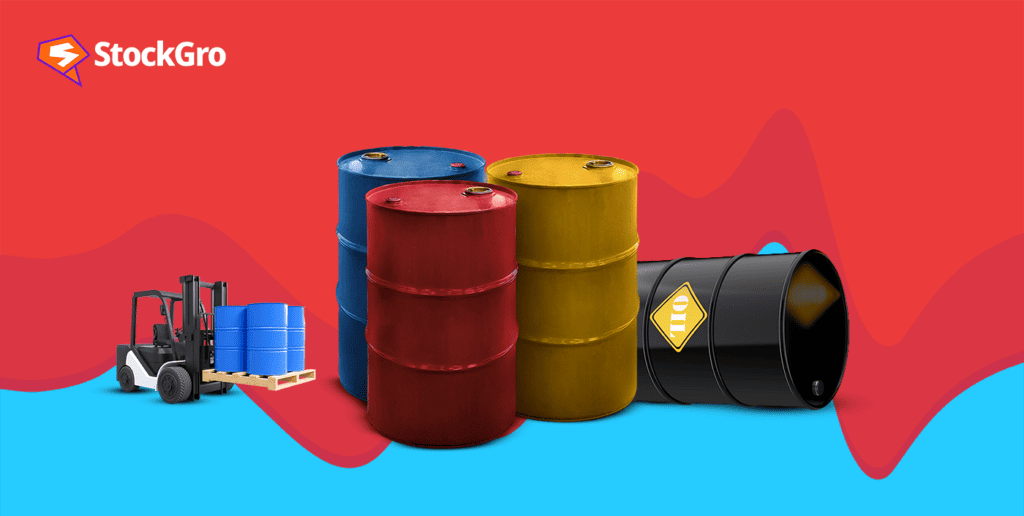
From a global perspective, crude oil is known to be one of the most essential commodities. Major oil-producing nations, oil corporations, traders, and consumers actively participate in the crude oil market. Moreover, it can also influence a country’s geopolitics, economy, and environment.
Global effects are vast regarding the price movements of crude oil. That’s why crude oil is a widely preferred option in commodity markets, regardless of whether one trades for the long term or the short term.
This article will discuss the definition of crude oil trading, how to begin trading crude oil in India, and the influential factors behind its price fluctuations. Let’s begin.
You may also like: What is a commodity? A short guide before you trade
What is crude oil?
Crude oil is an organically formed petroleum-based substance made up of deposits of hydrocarbons and other organic components that were once living things that existed hundreds of thousands of years ago. After being exposed to heat, pressure, and multiple layers of dirt, sand, and rock, these organisms finally transformed into a kind of fossil fuel that is processed into products. These products can be used as petrol, diesel, liquefied petroleum gases, and more in the petrochemical sector.
It is important to note that crude oil is a finite resource since it is not renewable and cannot be replenished naturally at the rate at which we use it.
What is crude oil trading, and how does it operate?
Trading crude oil involves trading contracts for F&O on various platforms, including online marketplaces, brokers, and exchanges. Speculators and arbitrageurs are just a few types of traders who use crude oil trading the most.
There are several varieties or “grades” of crude oil since the composition of the material may fluctuate significantly based on where it comes from.
Brent crude is one of the market’s most well-known crude oils with a comparatively moderate sulphur content, and an elevated API gravity. For international oil trade, it is often used as a reference price.
Additionally, West Texas Intermediate (WTI) and Dubai crude are standard crude oils that are frequently used. Due to its non-renewable nature, crude oil prices fluctuate significantly due to supply and demand issues. Understanding the characteristics of the oil market is thus crucial for traders to develop winning trading strategies.
Also read: Futures vs. Options: Differences every investor must know!
How to trade crude oil?
There is less demand for instant delivery than future delivery in the crude oil spot market. Investors don’t choose immediate delivery because of the difficulties of moving oil.
This is why most investors are more likely to enter into future contracts. With derivatives like CFDs, you can trade crude oil options as well. This way, instead of accepting delivery or ownership of actual oil, you can speculate on changes in the market value of listed oil options.
A trader who signs a commodity futures contract agrees to buy or sell a certain quantity of crude oil on a predetermined date. Here, every transaction has a predetermined cost.
The best way to understand the concept of commodity trading is through some examples.
Example 1: Trading commodities to hedge or manage risk
Trading commodities is often a good way to hedge your investments or lower your risk. Let’s say you sell barrels of crude oil on the market for Rs 700 each and make money. The price of oil on the market could decrease, meaning you would lose money.
You can enter into a futures contract with a buyer to safeguard yourself against losses brought on by unexpected price changes. This way, you may sell crude oil at Rs 700 per barrel. This idea is known as “hedging.”
Example 2: Trading commodities to profit or speculate
Now, imagine you are a trader who wants to buy and sell crude oil. Prices for crude oil may be going up because the market is bullish. There are 50 barrels in a cruise oil contract, each costing Rs 3,000. You don’t have to pay the total amount when you buy a futures contract, but rather pay Rs 7,500 or a margin of 5%,
Let’s say that a barrel of crude oil goes up to Rs 3,200. In this case, you will make Rs 200 for each barrel, for a total of Rs 10,000, after only investing Rs 7,500. When trading crude oil, you can use a lot of leverage. Even if the oil market is expected to drop, you can still profit with future contracts.
Also read: Option chain for smarter online trading
Crude oil futures trading on the MCX
The MCX offers the following kinds of crude oil contracts for trading:
- Crude Oil (Main): A price quote is provided per barrel. There are 100 barrels on the lot.
- Crude Oil (Mini): The quote is based on a price per barrel. There are only 10 barrels in the small crude oil lot size.
Crude oil mini’s small lot size guarantees that the required margin money is minimal. For this reason, investors prefer crude oil mini for a small crude oil futures lot size.
During the week, the MCX crude oil trading timing remains open from 9 a.m. to 11:30 p.m.
Price movements of crude oil: Influential factors
The oil market can be quite volatile because oil prices tend to shift at an even greater pace than most other commodities. But for day traders, opportunities are created from that very volatility of the market.
The following are some of the crucial aspects that have an impact on crude oil prices as a commodity:
Supply and demand: The dynamics of supply and demand can be influential for crude oil prices. In reducing the order of demand, the cost of production, storage space, and interest rates all impact the price of crude oil. The unusual combination of persistent demand and oversupply has put more pressure on oil prices recently.
OPEC remarks: The world’s biggest oil-producing states are members of the OPEC (Organisation of Petroleum Exporting Countries). Certain statements made by OPEC can influence expectations among investors and cause short-term fluctuations in the price of crude oil.
The value of the USD: One of the major participants in the global crude oil trade is the US. As such, the dollar’s current value may influence the overall price of crude oil.
Oil prices are also affected by supply routes, political unrest, and natural calamities in oil-producing regions like the Middle East.
Conclusion
Trading crude oil is popular due to its liquidity and volatility. Successful oil traders use crude oil market research to create trading strategies. It has a special place in the global political and economic systems, making it a great investment opportunity in almost any market scenario.

